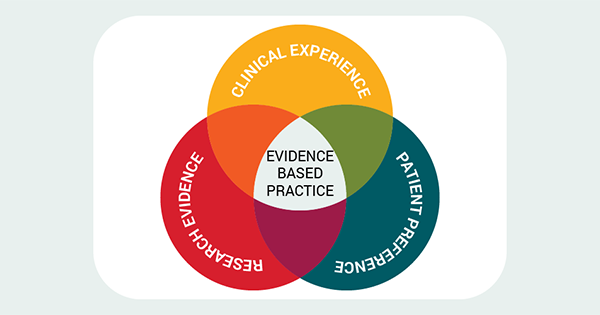In the previous paper in this series (Ellis, 2024), I considered the research hierarchy of evidence and what this might mean for the application of evidence-based practice. Many commentators consider quantitative research, especially of the experimental types such as randomised controlled trials, to be the best form of evidence trumped only by systematic reviews and meta-analyses.
The paper also noted how qualitative research appears lower down the hierarchy because it is deemed less generalisable. In some circumstances, depending on the question which needs to be addressed, qualitative research can be more valuable than quantitative. Therefore, the right form of evidence needs to be selected to inform different aspects of practice, so qualitative research informs a qualitative question, while quantitative research does the same for a quantitative question.
We also considered some of the barriers to applying evidence-based practice in the practice setting, such as the availability of time, staff, resources and organisational support. It is important to understand these barriers if they are to be addressed and evidence-based practice applied to health and social care practice. In this paper, I will consider some of the strategies which could be used to get evidence into practice.
Cultures of care
There is a lot in the health and social care literature about cultures of care, learning cultures and open cultures and how these play an important role in getting teams to work in evidence informed ways. Team cultures which do not accept change and which are not based on learning will almost certainly be difficult places to introduce evidence-based changes, let alone adopt an evidential approach to practice. This is because adopting evidence-based practice is not entirely straightforward It takes knowledge and skill and requires that team members are willing to adapt and change what they do and how they do it.
The National Institute for Health and Care Excellence (NICE, 2018) has principles for getting evidence into practice, and has identified that care cultures need to be ones where staff and leaders have shared values, and are open to change and focused on quality. This means that teams need to change their focus from simply getting the job done to focusing on excellence.
In their review of the literature on facilitating interprofessional learning cultures in nursing homes, Verbeek et al (2023) identified how having an open attitude to evidence, sharing knowledge and having mutual goals are some of the key facilitators to getting evidence into the practice setting. This suggests that there is more to becoming an evidence-informed team than accessing research.
However, in reality, busy health and social care professionals need to consider both getting the job done and ways of getting the job done better. If approaches to evidence-based practice are not pragmatic, then they will fail, because health and social care is at its heart a practical undertaking. That is to say to change a culture to one which accepts change and development, the team needs to see the value in the changes being made and the evidence being adopted.
Access to evidence
As well as having the right sort of culture, workplaces that want to adopt evidence need to have access to it. Without access to sources of evidence, health and social care practitioners cannot hope to adopt it. Key to accessing evidence are the skills required to search on databases and health resources online. Ellis (2023) identifies that practitioners need to develop not only the skills to be able to search online to find good quality research and other forms of evidence, but also the skills to critically appraise research.
There are a number of ways in which evidence can be accessed, including searching online search engines like Google Scholar, accessing free text papers and subscribing to journals pertinent to one’s area of practice. There are also sites dedicated to providing evidence, guidelines and other guidance for health and social care professionals. For example, NICE guidelines are rooted in evidence which has been reviewed for its quality, as are Cochrane reviews.
Interpreting and appraising evidence
As well as identifying research, it is important for health and social care practitioners who want to apply evidence to their practice to be in a position to appraise what they find – especially when it is not part of a NICE guideline or other review. Not all source of evidence are good quality and it is the role of the professional to be able to assess this for themselves (Moule, 2021).
Dakka et al (2022) in their systematic review of barriers to evidence-based practice in palliative care, identified how “process-related difficulties” can get in the way of adopting evidence , because many nurses lack the knowledge and skills to be able to identify and critically appraise research. They suggest that nurses should be given opportunities to access training and development to enable them to be able to appraise evidence and also suggest that such training may also be associated with a change in negative attitudes towards evidence-based practice and change in general.
While evidence-based practice is part of many pre- and post-registration healthcare professional curricula, the application of the skills to practice remains poor (Li et al, 2024) because of the realities of busy practice settings and the lack of evidential cultures in many areas of health and social care provision in the UK.
There are many tools available to help health and social care professionals to appraise evidence. These include the Critical Appraisal Skills Programme (CASP) checklists available at https://casp-uk.net and the critical appraisal tools available from the JBI (formerly Joanna Briggs Institute) at https://jbi.global/.
Appraisal tools enable any professional to appraise the quality of a research paper before considering whether to adopt its findings, but require that the user understands some of the language of research. For example, the CASP toolkits are specific to various types of research and provide a great guide for novice, or even expert, reviewers.
As well as asking about the quality of a piece of research, it is important to ask questions about whether a piece of research will apply where a person works (Parahoo, 2014). This requires that practitioners are knowledgeable about their area of practice and the types of people with whom they work.
Managing transitions
Getting evidence adopted in practice settings is an exercise in change management. The best change managers know that managing changes is not about things, it is about people. Bridges and Bridges (2017) are clear that changing how people think, which they call “transitions”, requires the application of psychology.
There is a simple reason for this – change involves loss. It means giving up an established method of working to adopt a new way, changing a mindset, losing the comfort of a known and established way of working and of being. Some people will feel aggrieved when a change is suggested because they feel it reflects poorly on them. In fact, changes do not reflect poorly on practitioners, they reflect positively.
We know that our understanding of science and the world in general changes as our abilities to understand new things develops and so our knowledge of practice changes and develops over time. Practice that stands still is a negative, while practitioners who embrace better ways of working should be admired.
So perhaps the most important element of the change journey is selling the idea of the change to the staff team. Helping people understand that it is a development on their practice and that it reflects positively on them and that the change benefits patients is by far the best way to start the process.
Conclusion
This paper has considered how teams might start to get evidence into practice. For many teams, becoming evidence-based will require a change in culture, such that they become focused as much on learning and developing as they are on getting the job done.
Change can be associated with loss, even when the change is one which people want to make. Leaders of change need to ensure that the team understands the reasons for the adoption of new evidence and for it to be successful, this needs to fit with the values of the team, for example improving patient care.
Healthcare professionals also need to develop skills in accessing, appraising and considering the application of evidence to their practice for this to be successful.





